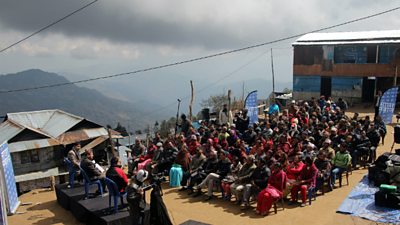Downloads
Through supporting the production of local discussion programmes in Nepal, 大象传媒 Media Action鈥檚 Global Governance Project aims to provide a platform for ordinary people to raise important local issues with government officials. Case study participants felt that these programmes contributed in a positive way to helping resolve local issues.
Publication date: April 2015
Context
Nepal continues to face a number of challenges in establishing stable and democratic governance. The current political environment prioritises decision making centrally - reinforcing a significant gulf between ordinary people and governing elites. This is partly because no government has survived more than two years since 1991 and corruption is rampant both in the government and Nepali politics.
Furthermore, the government鈥檚 inability to hold local elections has denied citizens their rights to participate in the political process. This is fuelled by a lack of clarity in the roles and responsibilities of various local bodies, poor mechanisms in monitoring of local expenditures and irregular updating of official information.
大象传媒 Media Action鈥檚 Global Governance Project was established with the aim of supporting the media, at both a national and local level, to play an effective role as government watchdog, guardian of the public interest and agent of open dialogue.
The project
大象传媒 Media Action鈥檚 Global Grant Governance project in Nepal aims to ensure media is fulfilling the role of supporting people to hold their government accountable. At the local level, the project aims to achieve this through building the capacity of regional radio stations across the country to produce localised versions of the national debate programme (Common Questions).
These local debate programmes provide a forum for ordinary people to raise important issues facing their local communities and to interact directly with service providers, political leaders, government officials and other concerned stakeholders on the issue.
Research methodology
This study explored what, if any, role and impact local discussion radio programmes had in bringing about change in the local communities that were featured on the show.
Eight case studies, two each from FM radio station partners in four districts of Nepal, were selected as part of the study.
Each case study included qualitative interviews with audience members (local community members), panellists (relevant stakeholders) and production staff involved in the programme, following up several months after the episode had aired to understand from multiple perspectives what had happened following the show.
Case studies of specific episodes were purposively selected based on anecdotal reports from partner FM stations.
Findings
Local discussion programmes provide a platform upon which local government officials can be questioned and directly asked to follow up, thus supporting accountability of leaders.
Local discussion programmes successfully highlight issues of local importance and prompt officials to commit to taking action. However, impact and satisfaction among audiences, in terms of actions taken following the show, varies across episodes.
The programmes help to inform and make local people fully aware of the issues being discussed and, in some cases, help identify who is accountable for the service.
Local discussion programmes bring attention to the needs of a diverse audience and ensure the voices of all groups have the opportunity to be heard, including women and girls and other marginalised groups.
Programmes motivated some communities to take action to address their own problems.
Implications
Audiences reported that local discussion programmes contributed in a positive way to helping resolve local issues through:
- making people more aware and informed about a particular issue;
- making people aware of their right to question authorities; and
- allowing the opportunity for an open discussion on important issues.
Audience members and panellists alike felt that connecting ordinary people to key government stakeholders was a successful element of the programmes.
Respondents felt that bringing all concerned stakeholders together in one forum effectively puts pressure on those in positions of power to be accountable.
Where solutions involve tangible actions at the service delivery level and were within the control of a singular public authority or office, commitments made on the show tended to be reflected in changes observed during the follow up case studies.
Where redressal was needed at a higher policy level, or required collaboration between several groups (including private companies), local people reported being less satisfied that commitments from the show had been fulfilled sufficiently.
